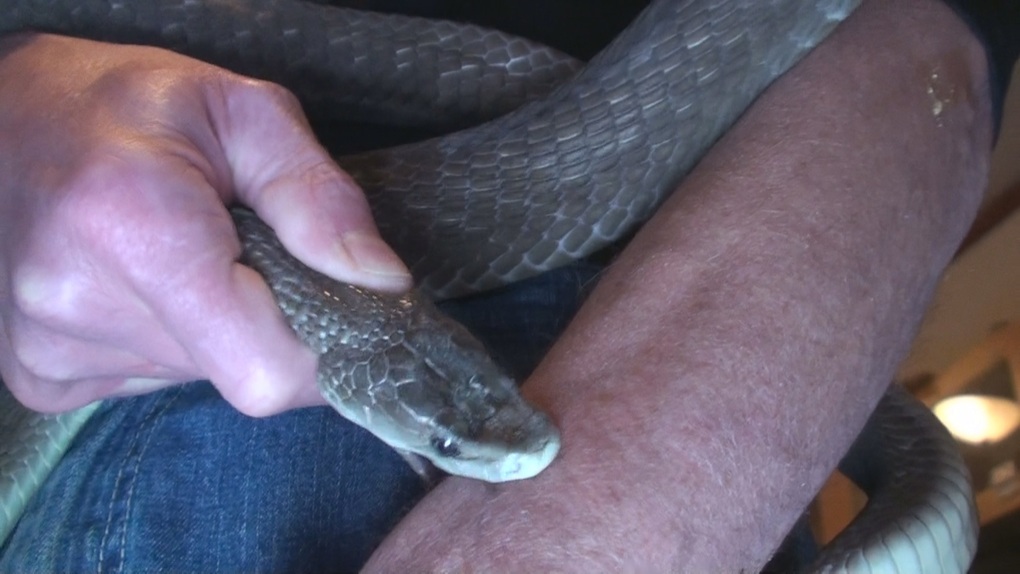In 2013, Tim Friede, a 45-year-old citizen (at that time) living in Milwaukee (Wisconsin, USA) caused a stir in the world when he conducted an experiment to prove that humans can become immune to the poison of snakes if they gradually get used to their venom.
To conduct his experiments, Friede injected himself with diluted venoms from various venomous snakes. Each time he injected venom, Friede believed that his body would produce more antibodies to eliminate the toxins from his body.
Friede not only injected venom into himself, but also let venomous snakes bite his hand. Friede said he let more than 100 venomous snakes bite him, including the Black Mamba, one of the most venomous snakes in the world, capable of killing an adult in less than 20 minutes.
Tim Friede lets a highly venomous black mamba bite his hand ( Video : Tim Friede).
After 12 years, Tim Friede is still completely healthy and his experiment has given science the opportunity to create a "super serum" that can effectively resist a wide range of poisonous snake venoms.
Opportunity to create a universal anti-venom "super serum"
In a paper published in the scientific journal Cell, scientists discussed the possibility of using Tim Friede's antibodies to create a "super serum" that would simultaneously resist the venom of multiple different snakes.
Essentially, the experiment Tim Friede conducted 12 years ago is similar to the way scientists create anti-snake venom serum.
Tim Friede let dozens of venomous snakes bite him to produce antibodies against snake venom (Photo: Tim Friede).
Accordingly, with the process of producing anti-snake venom serum, scientists will inject horses or sheep with a specific type of diluted venom of poisonous snakes, then they will harvest the antibodies produced by the sheep or horses to create anti-venom serum.
However, antivenom serums are only suitable for specific types of snakes. For example, antivenom serum for cobras cannot be used on victims of viper bites.
So, with the antibody obtained from Tim Friede, scientists hope they can create a "super serum" that can be used on many different types of venomous snakes, whether they possess cell-damaging or neurotoxic venom.
"Tim Friede has a unique and unprecedented immunological history. His body can produce antibodies that make a universal serum," said Jacob Glanville, CEO of biotechnology company Centivax, which is leading the team that created the serum from Tim Friede's antibodies.
The future of anti-snake venom serum
Researchers tested Tim Friede's antibodies on 19 species of venomous snakes in the cobra family, including the world's most venomous snakes such as mambas, taipans, coral snakes, kraits, and cobras.
Scientists combined the antibody from Tim Friede with varespladib, a known toxin inhibitor, to create two new antibodies.
The first antibody, called LNX-D09, protected mice from venom from six of the 19 snake species tested, while the second antibody, called SNX-B03, protected mice from all the venoms from the remaining snake species tested.
Scientists believe that the newly created antibody could also help fight the neurotoxins of other snakes in the cobra family that are not among the 19 species tested.
With the success of the antitoxin serum in mouse testing, the team is ready to move on to testing on other animals, such as dogs or horses… before testing on humans.
Scientists also plan to use Tim Friede's antibodies to create antivenom serum for species of the viper family.
"We are continuing to experiment with the hope of creating a universal antivenom cocktail. We will create two serums, one for the cobra family and one for the viper family, as these are the two most common venomous snake families in the world," said Professor Peter Kwong, from Columbia University, a member of the research team.
The development of a "super serum" against snake venom will open up opportunities to save more lives from snakebites, in the context that many victims of venomous snakebites have died due to the scarcity of serum or the lack of serum suitable for the venomous snake that bit them.
Source: https://dantri.com.vn/khoa-hoc/nguoi-dan-ong-thuong-de-ran-doc-can-vao-nguoi-cach-day-12-nam-gio-ra-sao-20250508003104250.htm
































![[Photo] National Assembly Chairman attends the seminar "Building and operating an international financial center and recommendations for Vietnam"](https://vphoto.vietnam.vn/thumb/1200x675/vietnam/resource/IMAGE/2025/7/28/76393436936e457db31ec84433289f72)




































































Comment (0)